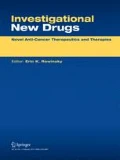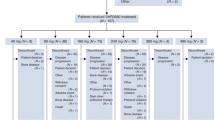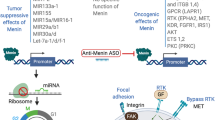Summary
Purpose Heat shock protein 27 (Hsp27) is implicated in prostate cancer progression. Apatorsen is a second generation phosphorothioate antisense inhibitor of Hsp27 expression. We evaluated apatorsen in patients with metastatic castration resistant prostate cancer (mCRPC). Experimental design Eligible patients were randomized 1:1 to receive intravenous apatorsen (3 loading doses of 600 mg within 5–9 days followed by weekly doses of 1000 mg) with oral prednisone 5 mg twice daily or prednisone alone. The primary endpoint was disease progression at 12 weeks. Crossover from prednisone alone was allowed after radiographic progression. Results 74 patients received apatorsen + prednisone (n = 36) or prednisone alone (n = 38). Twenty-five patients crossed-over to receive apatorsen + prednisone. Apatorsen treated patients received a median of 19 infusions. 50% of apatorsen + prednisone patients (95% CI: 32.9%, 67.1%) compared with 42% of prednisone patients (95% CI: 26.3%, 59.2%) did not have disease progression at week 12 (P = 0.33). A PSA decline of ≥50% was observed in 47% of apatorsen + prednisone and 24% of prednisone patients (P = 0.04), with a median duration of response of 24.1 weeks (95% CI: 12.0, 52) and 14.0 weeks (95% CI: 4.0, 44.4), respectively. A PSA decline of ≥50% was observed in 5 patients (20%) that received cross-over apatorsen. Infusion reactions were the most commonly reported adverse event occurring in 77% of apatorsen-treated patients. Conclusions Apatorsen + prednisone did not change the proportion of CRPC patients without disease progression at 12 weeks compared to prednisone but was associated with significant PSA declines. Further evaluation of Hsp27 targeting in prostate cancer is warranted.

Similar content being viewed by others
References
Siegel RL, Miller KD, Jemal A (2017) Cancer statistics, 2017. CA Cancer J Clin 67:7–30
Cheng HH, Lin DW, EY Y (2012) Advanced clinical states in prostate cancer. Urol Clin North Am 39:561–571
Ciocca DR, Calderwood SK (2005) Heat shock proteins in cancer: diagnostic, prognostic, predictive and treatment implications. Cell Stress Chaperones 10:86–103
Bruey JM, Paul C, Fromentin A, Hilpert S, Arrigo AP, Solary E, Garrido C (2000) Differential regulation of HSP27 oligomerization in tumor cells grown in vitro and in vivo. Oncogene 19:4855–4863
Concannon CG, Orrenius S, Samali A (2001) Hsp27 inhibits cytochrome c-mediated caspase activation by sequestering both pro-caspase-3 and cytochrome c. Gene Expr 9:195–201
Garrido C, Schmitt E, Cande C, Vahsen N, Parcellier A, Kroemer G (2003) HSP27 and HSP70: potentially oncogenic apotosis inhibitors. Cell Cycle 2:579–584
Lavoie JN, Hickey E, Weber LA, Landry J (1993) Modulation of actin microfilament dynamics and fluid phase pinocytosis by phosphorylation of heat shock protein 27. J Biol Chem 268:24210–24214
Rane MJ, Pan Y, Singh S, Powell DW, Wu R, Cummins T et al (2003) Heat shock protein 27 controls apoptosis by regulating Akt activation. J Biol Chem 278:27828–27835
Zoubeidi A, Zardan A, Beraldi E, Fazli L, Sowery R, Rennie P et al (2007) Cooperative interactions between androgen receptor (AR) and heat-shock protein 27 facilitate AR transcriptional activity. Cancer Res 67:10455–10465
Shiota M, Bishop JL, Nip KM, Zardan A, Takeuchi A, Cordonnier T et al (2013) Hsp27 regulates epithelial mesenchymal transition, metastasis, and circulating tumor cells in prostate cancer. Cancer Res 73:3109–3119
Rocchi P, Beraldi E, Ettinger S, Fazli L, Vessella RL, Nelson C, Gleave M (2005) Increased Hsp27 after androgen ablation facilitates androgen-independent progression in prostate cancer via signal transducers and activators of transcription 3-mediated suppression of apoptosis. Cancer Res 65:11083–11093
Gilbert B, Eckel B, Gonin V, Goldschneider D, Fombonne J, Deux B et al (2012) Targeting heat shock protein 27 (HspB1) interferes with bone metastasis and tumour formation in vivo. Br J Cancer 107:63–70
Rocchi P, So A, Kojima S, Signaevsky M, Beraldi E, Fazli L et al (2004) Heat shock protein 27 increases after androgen ablation and plays a cytoprotective role in hormone-refractory prostate cancer. Cancer Res 64:6595–6602
Kuramitsu Y, Wang Y, Taba K, Suenaga S, Ryozawa S, Kaino S et al (2012) Heat-shock protein 27 plays the key role in gemcitabine-resistance of pancreatic cancer cells. Anticancer Res 32:2295–2299
Kamada M, So A, Muramaki M, Rocchi P, Beraldi E, Gleave M (2007) Hsp27 knockdown using nucleotide-based therapies inhibit tumor growth and enhance chemotherapy in human bladder cancer cells. Mol Cancer Ther 6:299–308
Hsu HS, Lin JH, Huang WC, Hsu TW, Su K, Chiou SH et al (2011) Chemoresistance of lung cancer stemlike cells depends on activation of Hsp27. Cancer 117:1516–1528
Chi KN, Yu EY, Jacobs C, Bazov J, Kollmannsberger C, Higano CS et al (2016) A phase I dose-escalation study of apatorsen (OGX-427), an antisense inhibitor targeting heat shock protein 27 (Hsp27), in patients with castration-resistant prostate cancer and other advanced cancers. Ann Oncol 27:1116–1122
Eisenhauer EA, Therasse P, Bogaerts J, Schwartz LH, Sargent D, Ford R et al (2009) New response evaluation criteria in solid tumours: revised RECIST guideline (version 1.1). Eur J Cancer 45:228–247
Simon R (1989) Optimal two-stage designs for phase II clinical trials. Control Clin Trials 10:1–10
Scher HI, Halabi S, Tannock I, Morris M, Sternberg CN, Carducci MA et al (2008) Design and end points of clinical trials for patients with progressive prostate cancer and castrate levels of testosterone: recommendations of the prostate cancer clinical trials working group. J Clin Oncol 26:1148–1159
Scher HI, Morris MJ, Stadler WM, Higano C, Basch E, Fizazi K et al (2016) Trial design and objectives for castration-resistant prostate cancer: updated recommendations from the prostate cancer clinical trials working group 3. J Clin Oncol 34:1402–1418
Choueiri TK, Hahn NM, Werner L, Regan MM, Rosenberg JE, BOREALIS-02 investigators (2017) Borealis-2: A randomized phase II study of OGX-427 (apatorsen) plus docetaxel versus docetaxel alone in platinum-resistant metastatic urothelial cancer (Hoosier Cancer Research Network GU12-160). J Clin Oncol 35(6_suppl):289
Funding
This study was supported by a grant from the Terry Fox Research Institute (2008–11) and by OncoGenex Technologies, Inc., Vancouver, British Columbia, Canada.
Author information
Authors and Affiliations
Corresponding author
Ethics declarations
Conflict of interest
The institution of EYY received funding from OncoGeneX Pharmaceuticals, Inc. to aid in performance of the submitted research. The University of British Columbia has licensed patent applications on OGX-427, listing MEG as inventor, to OncoGenex Technologies, a Vancouver-based biotechnology company that MEG has founding shares in. Otherwise, there are no conflicts of interest.
Ethical approval
All procedures performed in studies involving human participants were in accordance with the ethical standards of the institutional and/or national research committee and with the 1964 Helsinki declaration and its later amendments or comparable ethical standards.
Informed consent
Informed consent was obtained from all individual participants included in the study.
Rights and permissions
About this article
Cite this article
Yu, E.Y., Ellard, S.L., Hotte, S.J. et al. A randomized phase 2 study of a HSP27 targeting antisense, apatorsen with prednisone versus prednisone alone, in patients with metastatic castration resistant prostate cancer. Invest New Drugs 36, 278–287 (2018). https://doi.org/10.1007/s10637-017-0553-x
Received:
Accepted:
Published:
Issue Date:
DOI: https://doi.org/10.1007/s10637-017-0553-x




